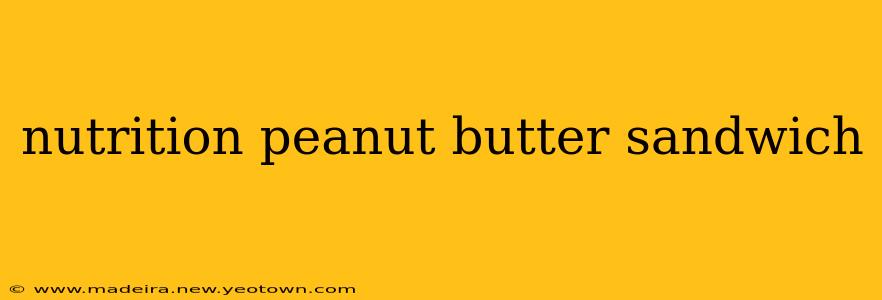The peanut butter sandwich. A childhood classic, a quick lunch staple, a midnight snack for the ages. But beyond its comforting familiarity, how nutritious is this beloved sandwich really? Let's delve into the nutritional profile of this simple yet surprisingly complex food, exploring its benefits, potential drawbacks, and how to make it a truly healthy part of your diet.
My name is Alex, and I've been a registered dietitian for over 10 years, specializing in family nutrition. I've seen firsthand the power of simple, wholesome foods to fuel bodies and minds. And the peanut butter sandwich, when made correctly, is a prime example.
What are the nutritional benefits of a peanut butter sandwich?
A peanut butter sandwich offers a surprisingly balanced nutritional punch. The combination of whole-grain bread and peanut butter provides a good source of carbohydrates for energy, healthy fats for satiety and brain function, and some protein for muscle building and repair.
Let's break it down:
-
Protein: Peanut butter is a great source of plant-based protein, essential for building and repairing tissues. Combined with the protein in the bread, a peanut butter sandwich offers a decent amount of protein, keeping you feeling fuller for longer.
-
Healthy Fats: Peanut butter is rich in monounsaturated and polyunsaturated fats, the "good" fats that are crucial for heart health and brain function. These fats also contribute to the sandwich's satisfying texture and flavor.
-
Fiber: Choosing whole-grain bread significantly boosts the fiber content of your sandwich. Fiber is vital for digestive health, regulating blood sugar levels, and promoting feelings of fullness.
-
Vitamins and Minerals: Both peanut butter and whole-grain bread contribute essential vitamins and minerals like Vitamin E (an antioxidant), magnesium, and potassium.
How many calories are in a peanut butter sandwich?
The calorie count of a peanut butter sandwich varies significantly depending on the ingredients. A sandwich made with two slices of white bread and two tablespoons of peanut butter can easily contain 300-400 calories. However, opting for whole-grain bread and reducing the amount of peanut butter can significantly lower the calorie count. Always check the nutrition labels of your specific ingredients to get an accurate estimate.
Is peanut butter healthy for weight loss?
This is a common question, and the answer is nuanced. Peanut butter's high fat content might seem counterintuitive for weight loss. However, the healthy fats in peanut butter can contribute to satiety, helping you feel full and consume fewer calories overall. The protein and fiber also aid in weight management by promoting fullness and stabilizing blood sugar levels. Moderation is key – a small portion as part of a balanced diet can be beneficial for weight loss.
What kind of bread is best for a peanut butter sandwich?
The bread you choose significantly impacts the nutritional value of your peanut butter sandwich. Whole-grain bread is the clear winner. It's higher in fiber, providing more nutrients and promoting better digestive health compared to white bread. Look for bread with a high fiber content and minimal added sugars.
What are the downsides of eating peanut butter sandwiches?
While generally healthy, peanut butter sandwiches do have some potential drawbacks:
-
Sugar Content: Some peanut butter brands contain added sugar, which can negatively impact blood sugar levels. Always check the ingredient list and opt for brands with minimal added sugar, ideally only peanuts and possibly salt.
-
Sodium: Many peanut butter brands contain added salt. Excessive sodium intake can contribute to high blood pressure. Look for low-sodium options.
-
Allergies: Peanut allergies are prevalent, so it's crucial to be aware of allergies before consuming peanut butter, especially with children.
-
Calorie Density: While the healthy fats and protein contribute to satiety, peanut butter is calorie-dense. Consuming too much can lead to weight gain if not balanced with overall caloric intake.
Making the Perfect Healthy Peanut Butter Sandwich
To maximize the nutritional benefits, choose whole-grain bread, natural peanut butter (with minimal added ingredients), and consider adding healthy extras like sliced banana, apple slices, or a sprinkle of chia seeds for added nutrients and flavor. Portion control is vital; stick to a reasonable serving size to manage your calorie intake.
The humble peanut butter sandwich, when made thoughtfully, can be a delicious and nutritious part of a balanced diet. By making informed choices about ingredients and portion sizes, you can enjoy this classic treat guilt-free and reap its many nutritional rewards.

